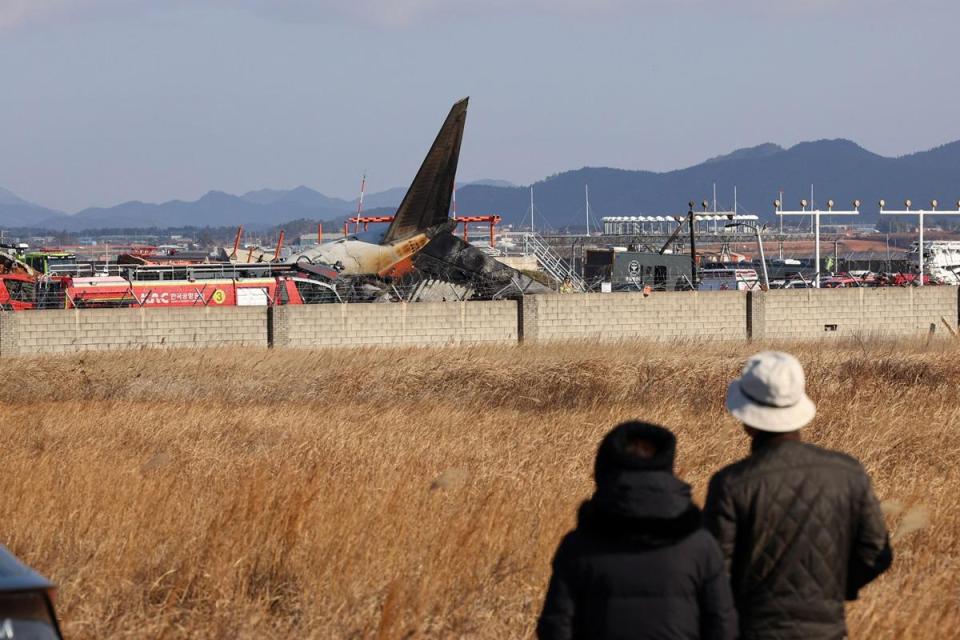On Thursday, South Korean police conducted raids on Jeju Air and the operator of Muan International Airport. This was part of their investigation into a tragic crash that occurred on Sunday, resulting in the deaths of 179 people. This incident marks the deadliest aviation disaster in South Korea’s history.
The Jeju Air flight 7C2216 had taken off from Bangkok, Thailand, and was headed for Muan in southwestern South Korea. During its landing, the Boeing 737-800 experienced a belly landing and overshot the runway. The aircraft exploded into flames after colliding with an embankment.
Rescuers managed to pull two crew members from the tail section of the plane. One of the rescued crew members remains in critical condition, while the other is receiving treatment for their injuries, according to a transport ministry official.
Joo Jong-wan, the deputy transport minister for civil aviation, announced that the conversion of data from the cockpit voice recorder into audio files was completed on Thursday. These audio files may offer crucial insights into the flight’s final moments.

Police investigators targeted several locations as part of their inquiry. They searched the offices of the airport operator and the aviation authority under the transportation ministry in Muan. They also checked Jeju Air’s office in Seoul, according to a statement from the South Jeolla provincial police.
Authorities planned to seize documents and materials related to the aircraft’s operation and maintenance, as well as the management of airport facilities, a police official informed Reuters.
Authorities have prohibited Jeju Air’s CEO Kim E-bae and another unnamed official from leaving the country. They are considered key witnesses who may face charges for causing deaths due to negligence. This offense could lead to a prison sentence of up to five years or a fine of up to 20 million won (approximately $13,600).
Jeju Air is cooperating with the police, as stated by director Song Kyeong-hoon during a media briefing.
Air safety experts have raised concerns about the embankment that supports the “localizer” antenna used for landings. They believe it is too rigid and positioned too close to the runway’s end.
Engineering professor Najmedin Meshkati from the University of Southern California expressed that this rigid structure became catastrophic when the aircraft skidded and collided with it. He also criticized the choice to mount the navigation antenna on a substantial concrete foundation instead of the standard metal tower or pylon.
Joo from the transportation ministry noted that they still cannot provide clear details about the upgrade plans at Muan airport, which resulted in adding this support structure for the navigation system.
The ministry is currently reviewing localizer equipment at airports across the nation.
An investigation into the crashed Jeju Air flight involves South Korean authorities, the U.S. National Transportation Safety Board (NTSB), the Federal Aviation Administration (FAA), and Boeing, the aircraft’s manufacturer.
There are still unanswered questions concerning why the aircraft did not deploy its landing gear. Additionally, it’s unclear why the pilot opted to initiate a second landing attempt after reporting a bird strike and declaring an emergency to air traffic control.
The flight data recorder, although slightly damaged, is being sent to the United States for analysis in collaboration with the NTSB.
Joo mentioned on Wednesday that releasing the cockpit voice recorder’s audio files to the public might be challenging, as they are crucial for the ongoing investigation.
Investigators from the NTSB, FAA, and Boeing are currently in South Korea to assist with the inquiry.
South Korea’s acting President Choi Sang-mok emphasized the need for immediate action during a disaster management meeting.
If inspections reveal any issues with the Boeing 737-800 aircraft operating in the country, he indicated that appropriate steps must be taken. Choi acknowledged the public’s concern regarding the same aircraft model involved in the accident. He called for thorough inspections related to operation, maintenance, education, and training by the transport ministry and relevant organizations.
At the meeting’s outset, his office provided his remarks.
Choi urged that all possible efforts be made to assist the victims’ families as their remains are returned to them. He also requested police action against individuals posting malicious messages and fake news on social media regarding the disaster.
Click here for more World news.

